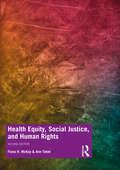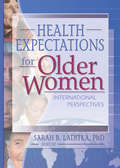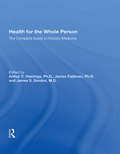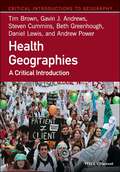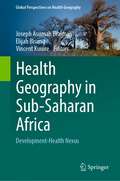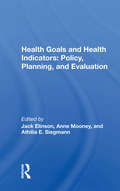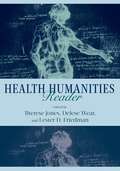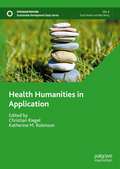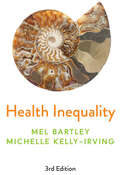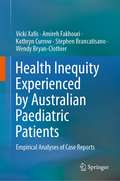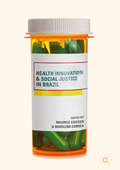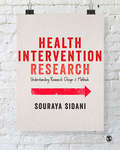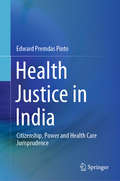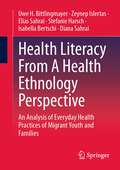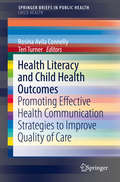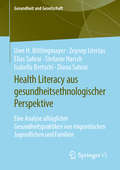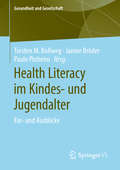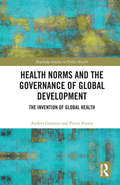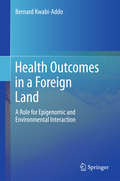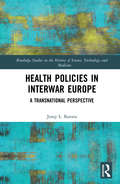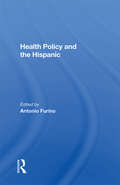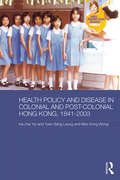- Table View
- List View
Health Equity, Social Justice and Human Rights
by Ann Taket Fiona H McKayThis text demystifies systems set up for the protection and promotion of human rights globally, regionally and nationally. It explores the use and usefulness of rights-based approaches as an important part of the toolbox available to health and welfare professionals and community members working in a variety of settings to improve health and reduce health inequities. Global in its scope, Health Equity, Social Justice and Human Rights presents examples from all over the world to illustrate the successful use of human rights approaches in fields such as HIV/AIDS, improving access to essential drugs, reproductive health, women’s health, and improving the health of marginalised and disadvantaged groups. Important links between health and human rights are increasingly recognised, and human rights can be viewed as one of the social determinants of health. A human rights framework provides an excellent foundation for advocacy on health inequalities, a value-based alternative to views of health as a commodity, and the opportunity to move away from public health action being based on charity. Understanding human rights and their interrelationships with health and health equity is essential for public health and health promotion practitioners, as well as being important for a wide range of other health and social welfare professionals. This text is valuable reading for students, practitioners and researchers concerned with combating health inequalities and promoting social justice.
Health Expectations for Older Women: International Perspectives
by Sarah B. LaditkaExplore international trends in health and longevity--with a special focus on older women!This essential book examines the latest research on life expectancy and “active life expectancy”--the number of years that women can expect to live free from major disability--in developed and developing countries around the world. It also explores the policy implications of the contributors’ findings. Here you'll find a global study using data from the World Health Organization, a European study using data from OECD countries, and studies of women in the United Kingdom, Fiji, The Netherlands, Japan, Canada, and the United States.With contributions from demographers, economists, epidemiologists, gerontologists, medical statisticians, policy analysts, physicians, public health directors, and sociologists, International Perspectives on Health Expectancies for Older Women compares mortality and morbidity trends in various populations. In addition to reviewing the current literature on active life expectancy, this informative book looks at: the distribution of total, unimpaired, and impaired life for several groups of older women defined by race, education, and marital history gender differences in health profiles in The Netherlands gender differences in life with and without six major diseases, including both morbid and mortal conditions in the United States how mortality and morbidity patterns differ for Canadian women and men 45 years of age and older, focusing on risk factors and chronic conditions such as low income, low education, abnormal body mass index, lack of physical activity, smoking, cancer, diabetes, and arthritis patterns of healthy life expectancy for older women around the globe a comparison of the development and progression of physical disability in Japanese men and women and more!
Health For The Whole Person: The Complete Guide To Holistic Medicine
by James Fadiman Arthur C. Hastings James S. GordonThis book presents attitudes, information, and tools for a holistic approach to medicine, health, and mental health. In our discussions among ourselves and with the contributing authors we defined three aspects of a holistic approach. First, such an approach involves expanding our focus to include the many personal, familial, social, and environmental factors that promote health, prevent illness, and encourage healing. Second, a holistic approach views the patient as an individual person, not as a symptom-bearing organism. This attitude emphasizes the self-responsibility of the person for his or her health and the importance of mobilizing the person's own health capacities, rather than treating illness only from the outside. Third, the holistic approach tries to make wise use of the many diagnostic, treatment, and health modalities that are available in addition to the standard materia medica- including alternative medical and healing systems as well as psychological techniques and physical modalities. Some of these methods of treatment and health practices are already accepted, others are accepted but not applied in practice, and still others need further research to explore the range of their uses.
Health Geographies: A Critical Introduction (Critical Introductions to Geography)
by Tim Brown Daniel Lewis Andrew Power Gavin J. Andrews Beth Greenhough Steven CumminsHealth Geographies: A Critical Introduction explores health and biomedical topics from a range of critical geographic perspectives. Building on the field’s past engagement with social theory it extends the focus of health geography into new areas of enquiry. Introduces key topics in health geography through clear and engaging examples and case studies drawn from around the world Incorporates multi-disciplinary perspectives and approaches applied in the field of health geography Identifies both health and biomedical issues as a central area of concern for critically oriented health geographers Features material that is alert to questions of global scale and difference, and sensitive to the political and economic as well sociocultural aspects of health Provides extensive pedagogic materials within the text and guidance for further study
Health Geography in Sub-Saharan Africa: Development-Health Nexus (Global Perspectives on Health Geography)
by Joseph Asumah Braimah Elijah Bisung Vincent KuuireThis volume creates a platform to showcase health geography research from countries in sub-Saharan Africa (SSA), and draws on theoretical and methodological innovations to initiate a discussion on the complexities of the issues impacting health in the region. Through theoretically and empirically grounded contributions from a variety of researchers working across SSA, the book addresses a wide range of topics that are usually treated separately when discussing health geography in the region. By bridging the social science and health disciplines, the book introduces new ways of thinking temporally and spatially about these topics in non-geography contexts as well. In 4 sections, the text will broadly appeal to students, researchers, teachers, policy makers, and global health professionals. Section 1 addresses the social determinants of health, including gender, disability, and other inequities and inequalities associated with healthcare access. Section 2 discusses the environmental determinants of health such as food security, water and sanitation, mining, and climate change. Section 3 focuses on current and emerging challenges to health in SSA, including ageing, non-communicable disease, and infectious diseases. Section 4 concludes the text by discussing the need to develop social and environmental intervention policies and strategies to address health challenges in SSA.
Health Goals And Health Indicators: Policy, Planning, And Evaluation
by Jack Elinson Anne Mooney Athilia E. SiegmannThis volume brings together the perspectives and expertise of both medical and social sciences. The major topics include criteria for the determination of health goals, the analysis of health policies, and the indicators of health status that may he used to judge the consequences of health practices and policies. Unmet health care needs, current national health policy and local planning, health data for policy and planning, and future directions in national health policy are also examined. These issues are then considered in light of the readiness of the sociomedical sciences to measure health status. Contributors discuss the behavioral measurement of health status, the measurement of psychological well-being, the assessment of dental health needs, and the possible impact of recently developed sociomedical health indicators on health policy.
Health Humanities Reader
by Mark Vonnegut Audrey Shafer Martha Stoddard Holmes Howard Brody Jeff Nisker Bradley Lewis Rosemarie Tong Ian Williams Sander L. Gilman Rafael Campo Daniel Goldberg Michael Rowe Thomas R. Cole Alice Dreger Joseph N. Straus Jonathan M. Metzl Arthur W. Frank E. Ann Kaplan Rebecca Hester John Lantos Shelley Wall Alan Bleakley Marjorie Levine-Clark Michael Sappol Mark Clark Professor Therese Jones Professor Delese Wear Professor Lester D. Friedman David H. Flood Rhonda L. Soricelli Lisa Keränen Martin F. Norden Professor Lisa I. Iezzoni Felicia Cohn Martha Montello Amy Haddad Rebecca Garden Jack Coulehan Professor Bernice Hausman Gretchen A. Case Allen Peterkin Susan M. Squier Sayantani DasGupta Maren Grainger-Monsen Benjamin Saxton Jerald Winakur Anne Hudson Jones Tod Chambers Raymond C. Barfield Lucy Selman Jeffrey P. Bishop Catherine Belling Paul Root Wolpe Professor Allison B. Kavey Julie M. Aultman Michael Blackie Erin Gentry Lamb Jay BaruchOver the past forty years, the health humanities, previously called the medical humanities, has emerged as one of the most exciting fields for interdisciplinary scholarship, advancing humanistic inquiry into bioethics, human rights, health care, and the uses of technology. It has also helped inspire medical practitioners to engage in deeper reflection about the human elements of their practice.In Health Humanities Reader, editors Therese Jones, Delese Wear, and Lester D. Friedman have assembled fifty-four leading scholars, educators, artists, and clinicians to survey the rich body of work that has already emerged from the field—and to imagine fresh approaches to the health humanities in these original essays. The collection’s contributors reflect the extraordinary diversity of the field, including scholars from the disciplines of disability studies, history, literature, nursing, religion, narrative medicine, philosophy, bioethics, medicine, and the social sciences. With warmth and humor, critical acumen and ethical insight, Health Humanities Reader truly humanizes the field of medicine. Its accessible language and broad scope offers something for everyone from the experienced medical professional to a reader interested in health and illness.
Health Humanities in Application (Sustainable Development Goals Series)
by Katherine M. Robinson Christian RiegelThis book focuses on health humanities in application. The field reflects many intellectual interests and practical applications, serving researchers, educators, students, health care practitioners, and community members wherever health and wellness and the humanities intersect. How we implement health humanities forms the core approach, and perspectives are global, including North America, Africa, Europe, and India. Emphasizing key developments in health humanities, the book’s chapters examine applications, including reproductive health policy and arts‑based research methods, black feminist approaches to health humanities pedagogy, artistic expressions of lived experience of the coronavirus, narratives of repair and re‑articulation and creativity, cultural competency in physician‑patient communication through dance, embodied dance practice as knowing and healing, interdisciplinarity and transdisciplinarity, eye tracking, ableism and disability, rethinking expertise in disability justice, disability and the Global South, coronavirus and Indian politics, visual storytelling in graphic medicine, and medical progress and racism in graphic fiction.
Health Inequalities and People with Intellectual Disabilities
by Eric Emerson Chris HattonPeople with intellectual disabilities die at a younger age and have poorer health than their non-disabled peers. This is largely avoidable and is unjust. This book uses concepts from contemporary public health to provide a comprehensive evidence-based overview of: the nature and extent of the health inequalities experienced by people with intellectual disabilities; why these inequalities occur and persist; and what can and needs to be done to address these inequalities. The authors have a wealth of firsthand experience gained from years of working at the interface between disability research and public health. This experience is collected and shared in this volume, which will be an invaluable resource for practitioners, advocates, policymakers and researchers concerned with health and social care and the wellbeing of disabled people.
Health Inequality: An Introduction to Concepts, Theories and Methods
by Mel Bartley Michelle Kelly-IrvingThe persistence of stark health inequalities in today’s world is painfully clear to see, not least in the effects of the Covid-19 pandemic and falling life expectancy in many parts of the world. How can we advance our understanding of the full extent of health inequality, what drives it, and ways to address it? The third edition of this popular book closely examines the influence of social class, gender, and race/ethnicity (among other issues) on health in the light of broad macro-political contexts. The classic behavioural, psychosocial, and material approaches to health and their embodiment within a life-course perspective are introduced but, importantly, are also re-situated within the growing understanding of the commercial and political determinants of health. Bartley and Kelly-Irving draw on extensive new evidence that shows how the chances for everyone to lead a long and healthy life depend on where power lies to control health-damaging policies and introduce health-promoting ones. Health Inequality will continue to be essential reading for students taking courses in the sociology of health and illness, social policy and welfare, health sciences, public health and epidemiology and all those interested in understanding the consequences of social inequality for health.
Health Inequity Experienced by Australian Paediatric Patients: Empirical Analyses of Case Reports
by Vicki Xafis Amireh Fakhouri Kathryn Currow Stephen Brancatisano Wendy Bryan-ClothierThis book provides rare insight into how real children/adolescents’ lives unfold as a result of health inequity. The authors present the findings of empirical research into the health and social circumstances of 61 Australian children/adolescents, as reported by healthcare professionals who attended to their medical needs, revealing how healthcare professionals deal with health inequity on the ground. Profound inequities in the health and wellbeing of children/adolescents worldwide have been the focus of intense research for decades. The extent to which children/adolescents’ health and wellbeing is impacted by violence, poverty, their inability to access integrated healthcare services, parental and adolescent substance abuse, unemployment, poor living conditions, poor nutrition, a fractured social support network, disrupted education, and lack of transportation, is widely recognized. While essential, statistical analyses alone cannot reveal the faces of those experiencing health inequity. This work highlights the need for urgent coordinated action to address health inequity so that children and young people have a chance to lead a full life in good health. It is relevant to researchers and practitioners whose work relates to improving children and young people’s lives.“This book should be required reading for those who influence policies developed by all the sectors mentioned above and their funding and administrative bodies – and politicians in particular” (Anonymous Reviewer).
Health Innovation and Social Justice in Brazil
by Maurice Cassier Marilena CorreaThis book examines the construction of an innovation system in Brazil’s health industries over the past twenty years. The authors argue that the system has remained active despite the crisis that began in 2014. However, while this crisis has led to cuts in public spending on research and health, it has simultaneously tended to stimulate local production and invention aimed at reducing deficits in the trade in medicines and medical technologies. The contributors highlight a model combining the acquisition of new technologies with social justice and the right to health, and introduce new concepts of the “nationalization” of technologies, innovation through copying and civil society regulation of industrial property and of the medicinal drug market.
Health Intervention Research: Understanding Research Design and Methods
by Souraya SidaniAt a time when evidence-based practice is the standard bearer for understanding health behaviour, problems and interventions, ensuring that researchers know the appropriate designs and methods for their research is more paramount than ever. Health Intervention Research will equip those doing research in these communities with the knowledge and tools they need to inform their methodological decisions when planning and conducting studies. This book describes both commonly used (e.g., randomized clinical trials) and advanced (e.g. preference trials, pragmatic trials) designs and methods for health intervention research. It outlines the theoretical reasoning underlying these different approaches, and synthesizes the evidence which supports or disputes different designs and methods. To achieve its aims, the book is divided into three main sections. The first section points to the need to base methodological decisions on evidence and highlights the importance of carefully selecting research designs and methods to maintain validity. The second section focuses on designs to determine the effects of intervention on outcomes, outlining their features and discussing how these can be used to evaluate interventions. The last section covers methods used in conducting intervention evaluation research. For each design and method, the following is covered: what it is, what the logic underlying it is, what the evidence supporting its effectiveness is, and also includes its advantages, its limitations, and how can it be implemented. This will be key reading for postgraduates and novice researchers in health and clinical psychology, health sciences and nursing.
Health Intervention Research: Understanding Research Design and Methods
by Souraya SidaniAt a time when evidence-based practice is the standard bearer for understanding health behaviour, problems and interventions, ensuring that researchers know the appropriate designs and methods for their research is more paramount than ever. Health Intervention Research will equip those doing research in these communities with the knowledge and tools they need to inform their methodological decisions when planning and conducting studies. This book describes both commonly used (e.g., randomized clinical trials) and advanced (e.g. preference trials, pragmatic trials) designs and methods for health intervention research. It outlines the theoretical reasoning underlying these different approaches, and synthesizes the evidence which supports or disputes different designs and methods. To achieve its aims, the book is divided into three main sections. The first section points to the need to base methodological decisions on evidence and highlights the importance of carefully selecting research designs and methods to maintain validity. The second section focuses on designs to determine the effects of intervention on outcomes, outlining their features and discussing how these can be used to evaluate interventions. The last section covers methods used in conducting intervention evaluation research. For each design and method, the following is covered: what it is, what the logic underlying it is, what the evidence supporting its effectiveness is, and also includes its advantages, its limitations, and how can it be implemented. This will be key reading for postgraduates and novice researchers in health and clinical psychology, health sciences and nursing.
Health Justice in India: Citizenship, Power and Health Care Jurisprudence
by Edward Premdas PintoThis book presents important fields of research in public healthcare in India from an interdisciplinary and health systems perspectives. Discussing how the exchange of power between the health justice triad, viz., the State (judiciary as the arm of the State), legal and medical professions, and civil society, cumulatively shapes the outcomes of health justice for citizens, it provides insights into India’s juridico-legal processes and of seeking justice in healthcare. It critically assesses civil society’s counter-hegemonic role in bolstering justice in health care and examines the potential of transforming health care jurisprudence into health justice. Repositioning the social right to healthcare as integral to social citizenship and social justice, and opening avenues for inter-professional and interdisciplinary power discourse in public health policy research, the book is of interest to academics, practitioners, students, researchers, and the wide academic community working in public health care issues broadly.
Health Law and Medical Ethics in Singapore
by Gary Chan Kok YewThis book encompasses two inter-related disciplines of health law and medical ethics applicable to Singapore. Apart from Singapore legal materials, it draws upon relevant case precedents and statutory developments from other common law countries and incorporates recommendations and reports by health-related bodies, agencies and committees. The book is written in an accessible manner suitable for tertiary students. It should also serve as a useful resource for medico-legal practitioners, academics and healthcare professionals who wish to keep abreast of the evolving legal and ethical developments concerning health and medicine.
Health Literacy From A Health Ethnology Perspective: An Analysis of Everyday Health Practices of Migrant Youth and Families
by Uwe H. Bittlingmayer Zeynep Islertas Elias Sahrai Stefanie Harsch Isabella Bertschi Diana SahraiThis book presents a health ethnology of health literacy among vulnerable groups. In addition to a comprehensive state of research and the development of a theory-oriented health literacy research, three case studies on vulnerable minorities from Germany and Switzerland are presented. The social dimension of health and health literacy, which can hardly be conceptualized in the individualistic competence-theoretical approaches, is particularly clearly highlighted. This book is a translation of the original German 1st edition Health Literacy aus gesundheitsethnologischer Perspektive by Uwe H. Bittlingmayer, published by Springer Fachmedien Wiesbaden GmbH, part of Springer Nature in 2020. The translation was done with the help of artificial intelligence (machine translation by the service DeepL.com). A subsequent human revision was done primarily in terms of content, so that the book will read stylistically differently from a conventional translation. Springer Nature works continuously to further the development of tools for the production of books and on the related technologies to support the authors.
Health Literacy and Child Health Outcomes
by Rosina Avila Connelly Teri TurnerThis compact resource presents current data on health literacy as it affects child health outcomes, with a sharp focus on improving communication between healthcare providers and pediatric patients and their families. A frequently overlooked social determinant of health in children, health literacy is shown as a critical skill for patients and families and a key aspect of patient engagement. The authors' evidence-based survey pinpoints common problems in healthcare providers' verbal and written communication with pediatric patients, their parents, and/or caregivers. Readers will learn about practical health literacy strategies for addressing and preventing miscommunication at the individual and systems levels. These improvements are linked to immediate results (e. g. , greater compliance, fewer medication errors) as well as improved long-term child health outcomes, including reduced health disparities and enhanced quality of life into adulthood. This transformative guide: #65533; Defines optimum health communication as necessary for working with all patients. #65533; Identifies common barriers to clear health communication. #65533; Traces the relationship between health literacy and child health outcomes, from the prenatal period and into young adulthood. #65533; Offers guidelines for creating effective patient education materials and a safe, health literacy oriented patient-centered environment. #65533; Integrates health literacy into health systems' quality improvement plans. Health Literacy and Child Health Outcomes informs students in MPH programs as well as public health scientists and scholars, and can also serve as an introductory text for students in public health ethics or a general applied ethics course. Public health professionals in diverse contexts such as local health departments and nonprofit organizations will appreciate its robust approach to ethical practice, professional development, and systems improvement. This will be a helpful guide for introducing health communication topics in medical education and allied health. Lastly, clinicians taking care of pediatric patients will find concise information and practical advice to apply in the clinical setting.
Health Literacy aus gesundheitsethnologischer Perspektive: Eine Analyse alltäglicher Gesundheitspraktiken von migrantischen Jugendlichen und Familien (Gesundheit und Gesellschaft)
by Uwe H. Bittlingmayer Zeynep Islertas Elias Sahrai Stefanie Harsch Isabella Bertschi Diana SahraiIm vorliegenden Buch wird eine Gesundheitsethnologie der Gesundheitskompetenz von vulnerablen Gruppen vorgelegt. Dabei werden neben einem umfassenden Forschungsstand und die Entwicklung einer theorie-orientierten Health-Literacy-Forschung drei Fallstudien über vulnerable Minderheiten aus Deutschland und der Schweiz präsentiert. Besonders deutlich herausgestellt wird die soziale Dimension von Gesundheit und Gesundheitskompetenz, die in den individualistischen kompetenztheoretischen Zugängen kaum konzeptionalisiert werden kann.
Health Literacy im Kindes- und Jugendalter: Ein- und Ausblicke (Gesundheit und Gesellschaft)
by Paulo Pinheiro Torsten M. Bollweg Janine BröderDas Thema Health Literacy, für das sich im deutschen Sprachgebrauch der Begriff der Gesundheitskompetenz etabliert hat, hat in der jüngeren Vergangenheit eine spürbare Aufwertung in Praxis, Politik und Forschung erfahren. Inhaltlich setzt es sich mit vielfältigen Aspekten des Umgangs mit gesundheitsbezogenen Informationen auseinander und adressiert somit eine Gelingensbedingung für den Erhalt und die Förderung von Gesundheit. Kinder und Jugendliche werden in diesen Kontexten zwar als hochrelevante Zielgruppe angesehen, sind in einer wissenschaftlichen Perspektive auf den Gegenstand bislang jedoch noch nicht ausreichend explizit berücksichtigt worden. Mit dem vorliegenden Sammelband wird ein strukturierender Überblick über den gegenwärtigen Forschungsstand zum Thema Health Literacy im Kindes- und Jugendalter gegeben. Die Sammlung von Beiträgen setzt sich einerseits aus Einblicken in eine Reihe von Forschungsergebnissen zusammen, die sich mit der Tätigkeit des Forschungsverbunds ‚Health Literacy in Childhood and Adolescence (HLCA)‘ assoziieren lassen, und bietet andererseits zahlreiche Anknüpfungspunkte an, die Ausblicke auf künftige Ausrichtungen des Handlungsfelds Health Literacy ermöglichen.
Health Norms and the Governance of Global Development: The Invention of Global Health
by Pieter Fourie Anders GranmoThis book maps the emergence of health in global development discourse and governance since 1990. It argues that health norms have emerged, diffused, and subsequently become internalised through the various direct and indirect negotiation processes that created the global development goals. Covid-19, Ebola, and HIV/AIDS are prime illustrations of the fact that health is supremely political. Governments – whether they are local, national, international, or multilateral – make decisions about their policy responses, coordinate their response, and channel the necessary resources. Such decisions are informed by local and global conditions as well as sets of values, norms, and standards that determine policy and interventions. As states and regions become more interconnected, the politics of health are increasingly relevant to the sustainable future envisioned by global governance. This book explains how considerations of global health have come to inform and infuse the United Nations development agenda. It identifies processes, actors, institutions, and interactions in global health by analysing two related case studies: the Millennium Development Goals and the Sustainable Development Goals. Providing an overview of, and insights about, the context of global development thinking and practice, the subtleties of global health, and global health governance, this book is an innovative contribution to the literature. It is suitable for students and scholars of global health, development studies, and international relations.
Health Outcomes in a Foreign Land
by Bernard Kwabi-AddoThis stimulating volume uses multiple lenses to analyze the complex causes of health disparities affecting African Americans, and explains how this knowledge can be used to reduce their destructive effects. Pinpointing genetic, non-genetic, and epigenetic factors underlying health conditions common to the population--including heart disease, hypertension, diabetes, and cancer--the author traces intricate links among these factors in the current environmental and social context. The section on non-genetic factors in health disparities, such as social determinants and health behaviors, add depth to the ongoing discourse on public health and health policy objectives. And the chapters on gene/environment interactions outline the vast potential for developing new multidisciplinary frontiers in shrinking health inequities and personalizing care. Included in the coverage: The African diaspora and disease-specific disparities. The genetic basis to health disparities. The role of epigenetics Economic factors and health Psychological issues and how they affect disparities Gene-environment interactions in health disparities Race, a biological or social concept Compelling and accessible, Health Outcomes in a Foreign Land will challenge and inspire medical students, epidemiologists, public health professionals, biomedical research scientists, and social scientists to go farther in their work. A wider audience would include policymakers, government officials, nurses, physicians, lawyers, economists, community outreach investigators, and interested general readers.
Health Policies in Interwar Europe: A Transnational Perspective (Routledge Studies in the History of Science, Technology and Medicine)
by Josep L. BaronaResearch into public health policies and expert instruction has been oriented traditionally in the national context. There is a rich historiography that analyses the development of health policies and systems in various European and American countries during the first decades of the twentieth century. What is often ignored, however, is the study of the great many connections and circulations of knowledge, people, technologies, artefacts and practices during that period between countries. This book redresses that balance.
Health Policy And The Hispanic
by Antonio FurinoExploring the many dimensions of Hispanic health issues, this book updates interested readers with recent information and offers a view of the depth, scope, and complementarity of the challenges of providing adequate health care. Accordingly, the book is organized in four sections addressing, first, the conceptual, institutional, and policy elements of the problems and their solutions; second, the clinical evidence about diseases for which Hispanics are disproportionally at risk; third, social and economic factors that have an impact on the health status of Hispanics; and, fourth, future policy options that could improve the health conditions of this increasingly large and underserved group of Americans. While clarifying the issues, the book documents the importance of seeking solutions to Hispanic health problems with determination and haste. Hispanics will soon represent the largest minority in American society. And, 20 million people with Latin American and Spanish origins contribute a large, youthful, and potentially very productive group of workers to our aging labor force. Finally, in searching for solutions to Hispanic health challenges, we learn that in order to improve the health of all Americans, while containing costs, it is necessary to address, proactively, the special needs of our culturally diverse society.
Health Policy and Disease in Colonial and Post-Colonial Hong Kong, 1841-2003 (Routledge Studies in the Modern History of Asia)
by Ka-che Yip Yuen Sang Leung Man Kong WongBesides looking at major outbreaks of diseases and how they were coped with, diseases such as malaria, smallpox, tuberculosis, plague, venereal disease, avian flu and SARS, this book also examines how the successive government regimes in Hong Kong took action to prevent diseases and control potential threats to health. It shows how policies impacted the various Chinese and non-Chinese groups, and how policies were often formulated as a result of negotiations between these different groups. By considering developments over a long historical period, the book contrasts the different approaches in the periods of colonial rule, Japanese occupation, post-war reconstruction, transition to decolonization, and Hong Kong as Special Administrative Region within the People’s Republic of China.
